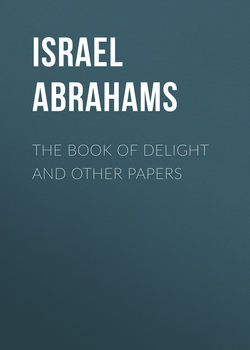Читать книгу The Book of Delight and Other Papers - Israel Abrahams - Страница 13
"THE BOOK OF DELIGHT"
THE CLEVER GIRL AND THE KING'S DREAM
ОглавлениеA king with many wives dreamt that he saw a monkey among them; his face fell, and his spirit was troubled. "This is none other," said he, "than a foreign king, who will invade my realm, and take my harem for his spoil." One of his officers told the king of a clever interpreter of dreams, and the king despatched him to find out the meaning of his ominous vision. He set forth on his mule, and met a countryman riding. "Carry me," said the officer, "or I will carry thee." The peasant was amazed. "But our asses carry us both," he said. "Thou tiller of the earth," said the officer, "thou art earth, and eatest earth. There is snow on the hill," continued the officer, and as the month was Tammuz, the peasant laughed. They passed a road with wheat growing on each side. "A horse blind in one eye has passed here," said the officer, "loaded with oil on one side, and with vinegar on the other." They saw a field richly covered with abounding corn, and the peasant praised it. "Yes," said the officer, "if the corn is not already eaten." They went on a little further and saw a lofty tower. "Well fortified," remarked the peasant. "Fortified without, if not ruined within," replied the officer. A funeral passed them. "As to this old man whom they are burying," said the officer, "I cannot tell whether he is alive or dead." And the peasant thought his companion mad to make such unintelligible remarks. They neared a village where the peasant lived, and he invited the officer to stay with him overnight.
The peasant, in the dead of the night, told his wife and daughters of the foolish things the officer had said, though he looked quite wise. "Nay," said the peasant's youngest daughter, a maiden of fifteen years, "the man is no fool; thou didst not comprehend the depth of his meaning. The tiller of the earth eats food grown from the earth. By the 'snow on the hill' is meant thy white beard (on thy head); thou shouldst have answered, 'Time caused it.' The horse blind in one eye he knew had passed, because he saw that the wheat was eaten on one side of the way, and not on the other; and as for its burden, he saw that the vinegar had parched the dust, while the oil had not. His saying, 'Carry me, or I will carry thee,' signifies that he who beguiles the way with stories and proverbs and riddles, carries his companion, relieving him from the tedium of the journey. The corn of the field you passed," continued the girl, "was already eaten if the owner was poor, and had sold it before it was reaped. The lofty and stately tower was in ruins within, if it was without necessary stores. About the funeral, too, his remark was true. If the old man left a son, he was still alive; if he was childless, he was, indeed, dead."
In the morning, the girl asked her father to give the officer the food she would prepare. She gave him thirty eggs, a dish full of milk, and a whole loaf. "Tell me," said she, "how many days old the month is; is the moon new, and the sun at its zenith?" Her father ate two eggs, a little of the loaf, and sipped some of the milk, and gave the rest to the officer. "Tell thy daughter," he said, "the sun is not full, neither is the moon, for the month is two days old." "Ah," laughed the peasant, as he told his daughter the answers of the officer, "ah, my girl, I told you he was a fool, for we are now in the middle of the month." "Did you eat anything of what I gave you?" asked the girl of her father. And he told her of the two eggs, the morsel of bread, and the sip of milk that he had taken. "Now I know," said the girl, "of a surety that the man is very wise." And the officer, too, felt that she was wise, and so he told her the king's dream. She went back with him to the king, for she told the officer that she could interpret the vision, but would do so only to the king in person, not through a deputy. "Search thy harem," said the girl, "and thou wilt find among thy women a man disguised in female garb." He searched, and found that her words were true. The man was slain, and the women, too, and the peasant's daughter became the king's sole queen, for he never took another wife besides her.
